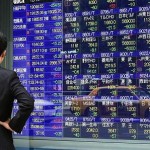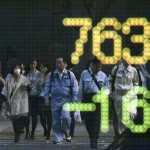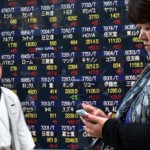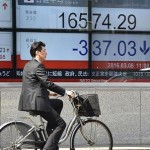Asia mostly higher with Nikkei leading the pack
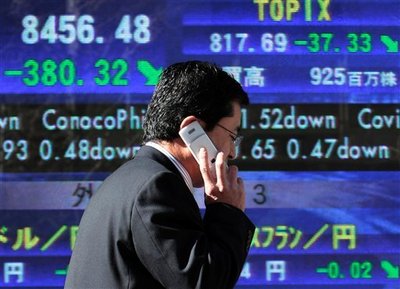
Asian markets rose Wednesday, with Japan’s Nikkei 225 index leading the way after a strong finish on Wall Street overnight.
The Japanese benchmark index was up 4.26 percent, with the yen hovering near the 114 handle against the dollar, after falling overnight. The dollar/yen pair traded at 113.90 as of 1:34 p.m. HK/SIN time.
Other markets followed suit, with Australia’s S&P/ASX 200 finishing on a one-month high, breaking the 5,000 level, to close up 98.94 points, or 2.01 percent, at 5,021.20. South Korea’s Kospi gained 1.70 percent while Hong Kong’s Hang Seng index was up 2.78 percent. Chinese markets also rallied, with the Shanghai composite up 3.19 percent while the smaller Shenzhen composite gained 3.48 percent.
Major U.S. indexes rose on Tuesday, with the Dow Jones industrial average up 2.11 percent, S&P 500 adding 2.39 percent, and the Nasdaq composite gaining 2.89 percent. Many analysts agreed that the better-than-expected data from the U.S. overnight reduced some of the concerns, for now, over a sharp slowdown in U.S. growth.
The People’s Bank of China (PBOC) set Wednesday’s yuan mid-point rate at 6.5490 compared to Tuesday’s fix at 6.5385. It was the lowest fix since Feb. 2. The dollar/yuan was flat at 6.5500 as of 1:36 p.m. SIN/HK time.
Singapore’s DBS Bank said in a morning note that in contrast to January, March has started on a friendly note.
“Most markets – equities, bond yields, oil and commodities – have been recovering after stabilizing around mid-Feb, but are still well below the levels of the first Fed hike on 16 Dec,” DBS said in the note.
Angus Nicholson, a market analyst at IG, wrote in his morning note the risk-on rally seen overnight in U.S. and Europe was mostly underpinned by the recent stability in oil prices above the $30 level over the past two weeks.
Oil prices, however, slipped during Asian hours, with U.S. crude futures down 1.19 percent at $33.99 a barrel, after gaining 2 percent inovernight trade. Global benchmark Brent was down 0.46 percent at $36.64 as of 1:38 p.m. HK/SIN, after settling up 0.6 percent during U.S. hours.
Energy plays across the region were mostly higher, with Santos adding 4.96 percent, Woodside Petroleum up by 5.08 percent, Japan’s Inpexgaining 3.58 percent, and Japan Petroleum up 4.23 percent. Chinese mainland oil stocks were also up, with Sinopec gaining 5.77 percent.
Investor appetite for risk assets sent gold prices retreating in overnight trade. U.S. gold futures for April delivery settled down 0.3 percent at $1,230.80.
During Asian hours, spot gold traded down 0.38 percent at $1,227.20 an ounce in afternoon trade. Gold miners in Australia were off sharply, shedding over 3 percent each. Newcrest shares closing down as much as 6.23 percent.
Nicholson added, “China announced cuts to the RRR this week and markets are looking to the upcoming European Central Bank and Bank of Japan meetings for signs of further global monetary stimulus.”
DBS Bank added in its note that the pressure will remain on the Bank of Japan, which introduced negative interest rates in late January, to further ease monetary policy. However, it does not expect any policy actions from the central bank in its mid-March meeting.
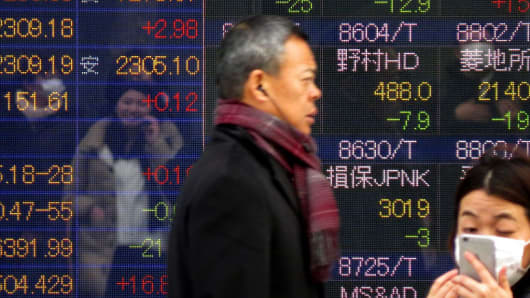
DBS Bank also expects Japan’s fourth quarter 2015 growth number to be likely revised down next week, when the final numbers are released.
“There is a good chance that investment growth in the GDP account will be revised down,” wrote DBS. Recent government data showedwhile Japanese companies raised spending on factories and equipment by 8.5 percent on-year in the October-December quarter, it was slower than their 11.2 percent on-year increase in capital spending in the third quarter of 2015.
Japanese export stocks were higher, following the yen’s overnight reversals. Major names such as Toyota was up 3.92 percent, Sonyadded 5.39 percent, and Honda gained 6.46 percent.
Down Under, economic data showed the world’s twelfth-largest economy expanded 3 percent on-year in the last three months of 2015, despite a slump in the global mining sector. The Australian dollarclimbed 0.88 percent to 0.7237 against the dollar as of 1:41 p.m. HK/SIN after the release.
Goldman Sachs analysts said in an afternoon note the positive gross domestic product (GDP) data will likely provide some relief to the Reserve Bank of Australia (RBA), which has this week kept its interest rate unchanged at 2 percent.
“The stronger annual rate in real GDP certainly works against the idea that further monetary easing is required. However, very weak private demand and a likely deterioration in labour market conditions cannot be ignored. We believe the RBA will be more focused on what happens next (rather than the historical growth recorded in 2015) when deciding whether any policy change is required in coming months,” the analysts wrote in the note.
Financials stocks closed up 2.95 percent, with the so-called Big Four banks – ANZ, Commonwealth Bank of Australia, Westpac, and NAB – gaining between 3.54 and 4.46 percent at market close.
Wednesday morning, ratings agency Moody’s changed its outlook on China’s credit rating. In a note, Moody’s said it has changed the outlook to negative from stable, “while affirming the Aa3 long-term senior unsecured debt, issuer ratings, and (P)Aa3 senior unsecured shelf rating.”
Moody’s said the key drivers of the outlook revision are the “ongoing and prospective weakening of fiscal metrics,” “continuing fall in reserve buffers due to capital outflows,” and “uncertainty about the authorities’ capacity to implement reforms.”
Michael Kelly, managing director and global head of Multi-Asset at PineBridge Investments, told CNBC’s “Squawk Box” that the downgrade means little at first glance. “Those whom Moody’s speaks to don’t own the debt. And I don’t think they’ve been close to buying the debt.”
He added the bigger story is that Moody’s is recognizing that China took a debt pause last year because of a bit of a rough landing. “And they’re going back,” he said. “They’ve made a decision to let the debt start growing again.”
Source: CNBC









